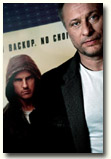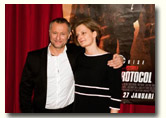|
Michael Nyqvist: Grandfather was
killed by the mafia
Source: Hemmets Journal - May 17, 2013
At six years old, he learned that he
was adopted - a truth that made actor Michael Nyqvist,
as a child, fantasize about his biological parents.
Today he has contact with his Italian dad, but he has
only met his mom once in a cafe.
After filming abroad for almost four years, actor
Michael Nyqvist has landed in Sweden. He will make
movies in Sweden and enjoy close proximity to the family
- his wife and two children.
"It's a struggle to be apart," says Michael.
Michael Nyqvist is dressed in a dark suit. The look is
as intense blue as when you see him on the big screen.
He does thai boxing and lifts weights.
"In the summers I paddle kayaks in Roslagen where we
have a summer place," he says. "It's magical - one gets
the kayak and the water. And you slide straight into the
animal kingdom. The birds do not really understand
what's coming, they keep calm with theirs. And that's
how great training is."
Says the man who was crushed against a car by his
colleague and mate Tom Cruise in the movie "Mission
Impossible: Ghost Protocol" where Michael plays a
villain.
"I had never been close to doing something like that. In
Sweden, we have actors knee protection only if we are
going to type box a bit. It was scary - and fun. I
enjoyed making that movie. Action is probably something
of an old boyhood dream. But just that scene hurt, I
broke three ribs. I told Tom: 'This was a big step for
Micke Nyqvist - a little for humanity.' Tom does all his
stunts."

This spring, Michael played a French
lover against Isabelle Huppert in the upcoming film
Folies Bergére.
"I am a Danish dentist and Isabelle has a crisis in her
marriage. It was a fun-filled recording. We became
childlike together and had fun. Isabelle has a wide game
style - she takes leave of herself as she enters into a
role. The film is about love after 40."
Michael Nyqvist, 52, is one of our most celebrated
actors. In his new autobiographical book, Dansa för oss,
we get to know how he started: When he was a
child, he like to role play...
The love of acting and doubt on his own ability pulses
through the book. He is pardoned from the role of Romeo
in a series on the Young Empire. He assumes he
accidentally entered the drama school. And he is sitting
in a tuxedo in New York's finest cinema - it's a gala
premier and Michael is speechless: almost all his scenes
are cut off.
Not a word about Guldbagges and success rushes.
"People have asked how I feel. How is my self-esteem?
'Yes, thank you,' I answer. The fact that I dare to
write about certain situations suggests a rather good
self-esteem. Interestingly, it seems to be something of
a taboo, to describe one's failures. But they are the
ones which have made me, not the moments of happiness."
He never reads a review - whether it's film, theater or
now his book. Not since joining Strindberg's Ghost
Sonata in his teenage years, and it was stated in
the newspaper that everyone was brilliant but that "the
student played by Nicke Nyqvist was well naive".
"It was a little tense between me and Malou von Sivers
in the television studio recently. She wanted to quote a
review in Svenska Dagbladet, but I stopped her. That's
exactly what my book is about. That there are others who
make us who we become. I don't like it..."
Before the theater became his life, he made a turn at
Danshögskolan where actor Mikael Persbrandt also was
trained in steps and piruettes.
"Persbrandt was good. I was a disaster. I entered
because of gender quotation, and because I fell in love
with a ballet dancer."
Michael has always liked writing. He wrote his first
book when he was five years old about misunderstandings
between children and adults.
"In my profession, there are so many who have views on
what you do. When I write, it's just me. The writing is
also a more intimate encounter with the audience, the
reader."
Michael is married to Catharina
Nyqvist-Ehrnrooth. They live in an apartment in
Södermalm, Stockholm, where the Millennium films are
partly filmed.

Together they have a son Arthur, 17,
and Michael has a daughter Ellen, 22, from a previous
relationship.
"I have been working abroad around the world for almost
four years, and I am so privileged that I can choose a
job that feels fun. But privately it's not a dream come
true. It's a struggle. Sometimes the family can
accompany me... It has been a plague for me, not
always being close to the children."
And how does love survive between you and your wife?
"We've been good at it. You learn.
When you are apart, the relationship will be full of
longing and nostalgia... We get close together by not
doing much. Eat fruity cheese. Hang around. Talk. And it
can be seductive and inspiring to be seen in new places
on earth - to become tourists together."
But now Michael has landed home. In this, we start
recording a film he wrote with friend and film director
Ulf Malmros. Michael takes the lead: A dad who does not
remember who he is after a stroke - after which his
daughter turns him into the father she missed.
How are you yourself as a father?
"Close. I think I'm pretty strict... They call me
'rottweilern' sometimes, haha!"
When Michael became a father at the age of 30, he began
to search for his biological parents. A trip he tells
about in his acclaimed debut book in 2009 called När barnet lagt
sig.
Michael spent his first year in a Swedish children's
home where a couple called Nyqvist came and picked him
up. When he was six years old, the family went to Italy.
And at an outdoor venue in Venice, his parents told him
that he had been adopted. That the biological mother was
a young Swedish. Dad Italian.
The adoption would remain a secret between the three:
Michael and his adoptive parents.
"A secret that made me very lonely."
"I thought long ago that Anita in the children's program
Anita and Televinken was my biological mother."
Through persistent detective work, he managed to trace
his biological parents in adulthood. First, his mother -
they met once at a cafe in Södermalm. And he got his
father's name.
Several years later he found him - the pharmacist
Marcello in Florence.
"My biological father and his family [I have two
half-sisters] have received me and my family with open
arms. We hear from them quite often, and see them when
we can."
It means "all", says Michael and throws out his arms:
"It's life before and after I got my Italian family. The
change was felt throughout my body - people looked at me
physically. I broadened. From floating above ground, I
got ground contact."
As an actor, he has become safer, more concrete. Perhaps
brave.
"I have accepted my background - it is no longer
distressed or diffused. I'm starting to relate."
His father's family come from Sicily where Michael's
grandfather had a business that made wine and oil. The
grandfather was shot to death after testifying in a
trial against the mafia.
"Most have blue eyes in northern Sicily like you," said
Marcello for the first time when father and son met. It
was in Stockholm. "But your eyes are similar to your
mother's."
Michael's biological mother has chosen not to have
contact with her son - they saw each other once.
"I do not blame her. I do not blame anyone. I'm just
telling how the adoption affected me. She can always
reach me. Read my books. Watch me in the movies. Maybe
that's why I have this profession?
Thoughts on his co-stars:
Tom Cruise: "A super professional. Privately, we became
friends. He has an eye for the whole production when he
makes a film role as if he were a producer at the same
time."
Isabelle Huppert: "Very French - an extremely open
actor with great psychological courage."
William Hurt: "An entirely different actor than
Tom. To me, he is the symbol of an elusive actor. I
enjoyed working with him."
[Edited translation]

|